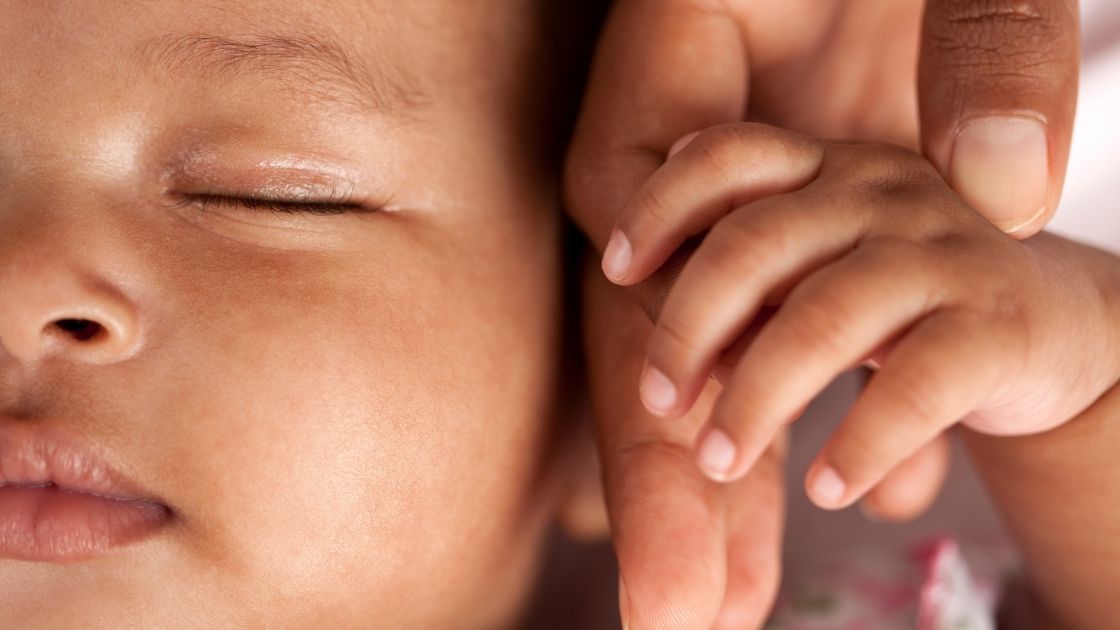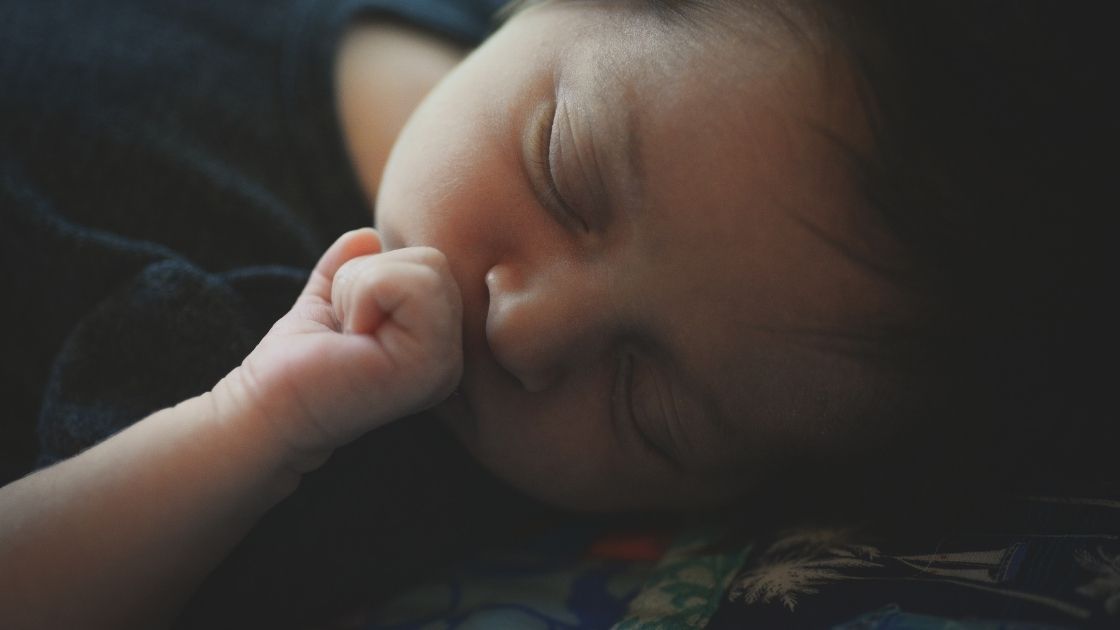A good night's sleep is one of the most important things for a baby's overall development. However, young children have their own sleep; many can sleep peacefully through the night, but some babies wake up often during the night.
Children waking up in the middle of the night also worries many parents. This not only affects the baby's health but also directly affects the health and mental health of the parents.
In particular, each parent will have different sleep training methods leading to different ways of handling when their child wakes up in the middle of the night.
Therefore, in this article, we summarize why babies wake up in the middle of the night, offer solutions to help parents improve this situation, and suggest several activities to reduce sleep training night waking for your baby.
What Causes Babies To Wake Up At Night?

Almost every baby will have difficulty falling asleep, waking up at night when teething or changing habits, and transitioning between periods.
Finding out what causes children to wake up frequently at night is still the concern of many mothers because if they can accurately judge why their children have trouble sleeping, parents will know how to take good care of their babies better.
Here are several reasons why babies wake up at night:
Sleep disturbance at developmental milestones
This is the term used to describe the stages in which your baby will have a change in sleep patterns. That's when babies are 4, 9, 13, and 18 months old. During these times, babies have many turning points in their essential physical and intellectual development, such as rolling, crawling, learning to walk, running, and jumping.
Babies' brains still process information during sleep, becoming more alert as they approach new developmental milestones. This makes it possible for your baby to wake up at night accidentally.
However, sleep disturbances that cause children to wake up in the middle of the night are a normal manifestation in these developmental stages of children. It is like a baby's temporary reaction to the change in the body's developmental milestones, so parents may not need to worry too much about this cause.
Ignore sleep during crisis week
Sleep crisis week is a common phenomenon in babies aged 13, 15, and 17, but it especially occurs in the first 6 months when the baby turns 2. These crisis weeks can last for many weeks.
Two Dutch pediatricians, Hetty van de Rijt and Frans Plooij, who have studied children's crisis weeks, shared that mothers will have to deal with their baby's "3Cs" during this challenging period of Crying, Clinginess, and Crankiness. These are signs that your baby is going through a period of mental development, and, understandably, your baby is fussy, has trouble falling asleep, and doesn't sleep well.
Different circadian rhythms
Sleep time depends on the age and the requirements of each body. In children, the need for sleep is very high; every 1 hour of activity must be compensated by 2 hours of sleep, which is 4 times more than adults.
The younger the age, the higher the need for sleep (newborns sleep 20-22 hours daily). As we age, the need for sleep will decrease, at 1 year old only 16 hours, 2 years old 14 hours, 3 years old 13 hours. At 16, children only have 8 hours of sleep, just like adults.
However, most children can only sleep about 4-5 hours, not sleeping for 8 hours like adults. Therefore, it is entirely normal for children to stay up at night.
Space and place to sleep
The sleeping environment affects a baby's sleep a lot. An environment with a moderate temperature, suitable light, and no noise will help your baby sleep soundly and deeply.
Hence, your baby may wake up in the middle of the night because factors from the sleeping environment, such as unclean bedding and clothes, make the child feel uncomfortable and itchy. The light in the bedroom is too bright or inappropriate for the child.
Besides, the room temperature is too hot or too cold will also make it difficult for the child to sleep. In addition, the noisy surroundings, the loud music, etc., easily startled the children to wake up.
Sleeping positions such as the baby lying on top of the parent, the parent holding it while sleeping, or sleeping in another place, such as in a chair, can be uncomfortable for the baby.
In particular, because children are susceptible to scents, a small change, such as a mother using a new washing powder, a different room spray scent, etc., can also cause the baby to wake up mid-sleep.
Sleep Training Night Waking: How To Deal With Night Wakings?
If your baby suddenly wakes up at night, you can apply the following ways to put your baby to sleep:
Talking softly and soothing

Talk softly and soothe when your child wakes up suddenly at night. Stay with your child until they are calm, but avoid talking loudly, too much, and turning on bright lights.
It may take a few nights or weeks for your baby to sleep well again, but the more closely you monitor your child's sleep habits, the sooner the problem will be resolved.
Ensure a comfortable sleeping state for your baby
If the baby is irritable, scratches his head or stomach with his hands, rolls, and turns constantly ... try touching the baby's back and head to see if there is sweat on his back and hair. Your baby may be too hot to sleep.
Mother should reduce the bedroom temperature by turning on the air conditioner and removing obstacles around the baby, such as stuffed animals, blankets, or pillows ... to help the baby feel cooler.
Coaxing the baby to go back to sleep
Babies also have fears and bad dreams. Sometimes when the baby sleeps, the mother sees the baby whimpering or bursting into tears; that is, the baby has had some fear in his sleep.
At this time, the baby wants to be comforted by the mother, or the mother just needs to put her hand on her chest to make her feel more secure and continue to fall asleep.
Sleep Training Night Waking: How To Eliminate Night Waking?
To help babies have complete sleep and development, parents need to understand how to help babies sleep profoundly and not wake up at night.

How to stop night wakings for baby
First, mom needs to create signals to help her baby know it's time to go to sleep. Some warning signals include taking a warm bath at a fixed time, singing a lullaby with a gentle melody, and changing into night clothes. Gradually these activities will become a habit of the baby before each bedtime.
However, remember that the baby should not be active, playing 1 hour before bedtime. Avoid making loud noises and intense sensations that surprise children, and avoid exposing them to electronic devices or other factors that can cause them to lose sleep.
A baby's sleep will only be deep and uninterrupted if the baby is fully fed. Therefore, make sure your baby is full at bedtime. In addition, mom should give her baby healthy foods good for the digestive system because otherwise, the baby's stomach will be uncomfortable, disturbing his sleep at night.
Finally, mom needs to increase her physical contact with her baby. Mom hugs care, and kisses to express love; I'm sure I will have better and deeper sleep, and I will no longer be startled and wake up many times during the night.
Avoid these sleep training mistakes
For your baby to have a good night's sleep, mom needs to avoid these things:

Closing
Through the above sharing, surely mother understands why her baby often wakes up in the middle of the night, right? This is not a severe problem, so you do not need to worry too much.
Once babies have a deep sleep, they will always be healthy, active, and develop well from the beginning. Therefore, mothers should pay more attention to their baby's sleep, creating a suitable environment for a good night's sleep.

